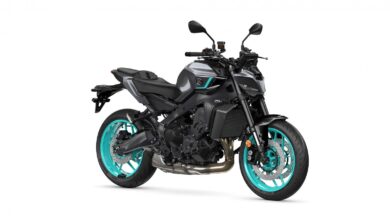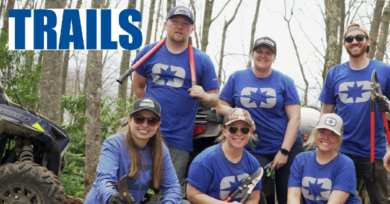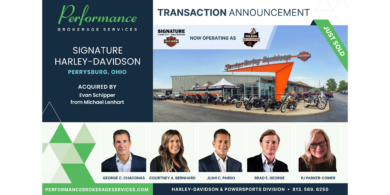Nov. 12, 2007 – The importance of selling (and saving) the industry
At the recent bi-annual gathering of State Department of Motor Vehicle Departments, Motorcycle Industry Council (MIC) President Tim Buche and I endeavored to sell the position of the industry regarding how motorcycles and ATVs should be sold in the respective states of the officials present.
On this subject, the industry’s OEMs and dealers clearly concur.
We have spent the last 38 years establishing ourselves as an industry. Along the way we have developed many safeguards and resources for consumers. We have established ourselves in the retail marketplace as dealers, and the OEM suppliers have exceeded what consumers receive from automobile manufacturers. Today we are faced with a new wave of manufacturers from China and other countries attempting to make an end run around all we have worked to establish.
Both Buche and I tried to focus on the interests of the consumer. I stressed that while there was certainly an economic impact on established dealers and existing manufacturers, our objection was not about lost income. We sell a product that, in the interest of the consumer, must be regulated. There is just too much inherent risk associated with the operation of the product for it to be sold by anyone other than a dealer with the resources and commitment to market in a sane manner and to provide for training and the needed safety equipment. (See accompanying column for the speech.)
Buche did a great job of providing statistical data to support what we were presenting. MIC data enabled Buche to show registration and usage as well as the number of people injured using the products. My point was that while the MIC could tell you how many people were hurt, dealers could tell you their names. The direct contact and ongoing involvement dealers have with their customers make them take safety very seriously. We are appalled at what we see being offered as an off-the-shelf item by people who do not have a clue about how to operate or service the vehicle.
Please read my comments and consider making similar comments to DMV officials in your state as only 25 or so were represented at our presentation. Your state association needs to get legislation introduced to protect the consumers in your state and your future as a dealer. This is not an abstract threat. If we fail to regulate who and how product is sold, the value of your business is greatly at risk.
History has shown that dealers only react, in any great numbers, to a crisis. Well we have one, with a capital C, right here in River City, or wherever you are located. We have a strong argument to present to the legislature and to the DMV, and it needs to be presented. If we fail to act, just think how far this can go and how much it will cost you when all of the big box retailers are selling everything that you are, other than bona fide motor vehicles, and maybe those too.
Don’t just read this and agree with me.
Contact your state dealer association and get an update on where they are on the matter. If you are not a member, forget about any reason you ever had for not joining and do it. If you do not have an association, do what dealers in Georgia, Oklahoma, Nevada and Nebraska did to start or restart an association. The legislation we need also addresses out-of-state sales that are happening everywhere. We have the National Council of Motorcycle Dealer Associations (NCMDA) to help. Call Karen Rasmussen, the association’s executive secretary, at 340/719-8591 (my number too) or e-mail me at edlemco@aol.com if you need some help.
I’LL BE SEEING YA’
I recently spoke to the Maryland Dealers Association and look forward to attending the following dealer association meetings: Virginia on Nov. 18, Florida on Nov. 20, North and South Carolina in January and the Canadian Dealer Association on Jan. 30.
Cheers, Ed.
(Editor’s note: Ed Lemco asked Powersports Business to publish his recent speech to the National Association of State Motor Vehicle Departments. We accepted, with the belief that dealers who supported Lemco’s statements could use this speech as a vehicle to help them begin a discussion with their own local legislators.)
PORTLAND, MAINE — Tim Buche of the Motorcycle Industry Council has provided you with an overview of the industry. I would like to share the view from the dealers’ prospective and how they strive to serve the people in your state.
I have been in the industry for 38 years, and in my failed retirement I serve as executive director of the National Council of State Motorcycle Dealer Associations.
Recent developments are a real concern for the industry and consumers.
First please allow me to present a little background on the retail segment of the industry, which is really only around 40 years old. Yes, motorcycles first came on the scene in the 1890s, the same time as automobiles, but we have been a lot slower to emerge.
Thirty-eight years ago, there really were no dealers as we know them today. In 1970, when I was a young district manager for U.S. Suzuki, covering Washington, Oregon, Idaho and Montana, virtually our entire product was sold as a sideline to a primary retail exercise. We were in sporting goods stores, tires shops, gas stations and in one memorable case, our products in Cut Bank, Mont., were sold by Burns Brothers Funeral Home and Suzuki. The products of our industry had limited appeal, and the low technology and dependability limited sales to hard-core enthusiasts. It was truly a case of enthusiasts selling to enthusiasts.
We have evolved to the point that we are now catering to a mainstream clientele. Our product lines are varied, truly high-tech and dependable.
The increased dependability, ease of operation and general acceptance has led to a true emergence of full-service motorcycle dealers in thousands of communities across the country. There are now large facilities located in prime retail locations and the owners are often prominent members of the local community.
What has not changed is that the dealers are still enthusiasts. They are in the business because they are passionate about what they sell. Just as the customers are passionate about what they buy.
This is such a huge difference if we compare with the automobile business. I am sure everyone here owns and operates an automobile, but when was the last time you hung out on a weekend at the Chevrolet dealership?
This relationship with the customers is really an important issue for the dealer and the community served. There’s an inherent risk with motorcycles and ATVs and the other powersport products we sell. Users can and do get hurt operating what we sell.
We know this, and when it happens, it is not merely an abstract statistic to the dealership and its staff. We know these users personally; they visit us regularly; we ride with them and socialize with them. We sold them the bike, and we provided the safety equipment that was designed to protect them.
It is an awesome responsibility that every dealer I know takes very seriously. We always try to match the right equipment to the right user and take several steps to assure t they are prepared to operate it safely.
We represent many well-established brands: Honda, Harley-Davidson, Yamaha, Suzuki, Kawasaki, BMW, Polaris and many other established manufacturers. All of these OEMs require their product be prepared by qualified mechanics, fully assembled and serviced before it is delivered to the consumer. None allow the product to be delivered “in the box.”
In spite of high quality control by our OEM suppliers, there are often repairs and adjustments that need to be made before the motorcycle or ATV is safe to be used.
In recent years we have seen a large influx of product being imported from China and other countries that is being distributed without regard to any of the consumer safeguards that the industry has developed. State associations have attempted to enact legislation to address this concern and we have sought the support of the state motor vehicle departments that regulate our business.
We have frequently not received the support, and in some cases even had our legislation thwarted by the states’ DMVs, which have cited lack of resources or that such oversight was outside of its ability to do so.
I often speak to state dealer associations and their members. Please let me assure you that the conversation seldom comes down to economics. The concern is genuinely far more than the bottom line. There is no interest in restricting competition, just an effort to have the product sold in a sane manner.
To be clear, there are some importers of Chinese products who retail through established dealers and/or establish their own dealers who are licensed by the state and have adequate resources to serve consumers.
Motorcycles and ATVs should never be sold as an off-the-shelf item. States regulate the sale of many products for good reasons. We might all wish that parents and grandparents would always be able to exercise good judgment.
But all too often a “Grandpa buy me that” results in a “motorized toy” going home in a box, to be assembled with the resources possessed by mom and dad. Motorcycles and ATVs, regardless of size, are not motorized toys, which is the label used by a number of importers of product from China.
We have all had the experience of buying, or attempting to buy, a flat screen TV, computer or appliance from a mass merchandiser. It is totally unacceptable for motorcycles or ATVs, no matter how they are labeled, to be sold in that manner.
At a recent convention the industry holds each year in Indianapolis, I was approached by the head of the Chinese trade delegation that sponsored the “China Pavilion,” which showcased much of the Chinese product available in the U.S. He had sought me out to take exception to an article that I had written. He wanted to assure me they were not irresponsible and that all of the product had the approval of “The Government.” He of course meant the DOT, EPA and Customs.
I pointed out to him that in this country, delivery to the ultimate consumer was usually regulated by state governments. Coming from a country where everything had centralized control, he had trouble understanding the concept.
Every motorcycle and ATV sold in your state should be sold by a dealer licensed to do business by your state. Dealers are ready and willing to collect sales tax and license fees to support the effort. I know you are very busy agencies and have a lot of varied responsibilities, but I hope you will join us in sharing an awesome responsibility. psb
Ed Lemco has been involved with the powersports industry for more than 30 years. Lemco, the former owner of Lemco Management Group, is the founder and executive director of the National Council of Motorcycle Dealer Associations. Lemco currently operates a call center for dealers in St Croix. psb




